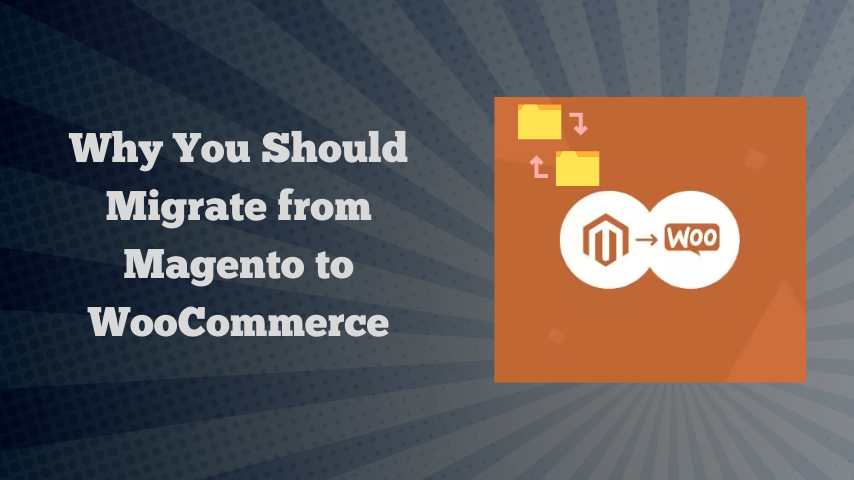Benefits of Migrating from Magento to WooCommerce
If you’re managing an online store on Magento and looking to expand your reach, cut costs, or simplify management, it might be time to consider WooCommerce. Magento and WooCommerce are both powerful eCommerce platforms, but they cater to different business needs. Migrating from Magento to WooCommerce can bring substantial benefits, especially for businesses seeking a flexible, user-friendly, and cost-effective solution.
In this article, we’ll discuss the key advantages of Magento to WooCommerce migration, including cost savings, ease of use, and greater customization, along with insights into using the Magento Migration for WooCommerce plugin to make the process seamless.
1. Cost-Effectiveness
One of the primary reasons store owners switch from Magento to WooCommerce is the significant cost savings. Magento can be expensive, especially with the Magento Commerce version, which charges licensing fees based on the gross revenue of your store. WooCommerce, on the other hand, is free to use, with no licensing fees. Since WooCommerce runs as a WordPress plugin, you only need to pay for hosting, domain registration, and any premium plugins you choose to add.
Benefits:
- No Licensing Fees: WooCommerce offers a free core version, making it ideal for businesses looking to cut operational costs.
- Affordable Customization: WooCommerce offers a range of free and paid plugins, allowing you to add functionality without breaking the bank.
- Flexible Hosting Options: With WooCommerce, you’re not restricted to one hosting provider, giving you the freedom to choose a plan that fits your budget.
2. Ease of Use
WooCommerce is known for its user-friendly interface, making it accessible for business owners without technical expertise. Magento, on the other hand, has a steeper learning curve, often requiring technical assistance for customization and management. WooCommerce’s intuitive interface allows store owners to manage product listings, orders, and customer details more easily, reducing the need for a dedicated IT team.
Benefits:
- Simple Setup and Management: WooCommerce offers a seamless integration with WordPress, which many users find easier to navigate.
- Reduced Dependency on Developers: With WooCommerce, business owners can perform updates, manage products, and monitor performance independently.
- Comprehensive Documentation and Support: WooCommerce provides extensive documentation and access to a supportive community, simplifying the process for beginners.
3. Customization and Flexibility
WooCommerce allows a high level of customization through plugins and themes, making it possible to create a store that reflects your brand identity and meets your specific needs. While Magento is also customizable, it often requires more technical knowledge, limiting what non-technical store owners can achieve.
Benefits:
- Wide Selection of Plugins and Themes: WooCommerce offers a vast library of plugins for functionality and themes for aesthetic customization, catering to all business types.
- No Technical Restrictions: The WooCommerce ecosystem is expansive, allowing store owners to add payment gateways, integrate marketing tools, and customize checkout experiences without advanced coding knowledge.
- Seamless Integration with WordPress: WooCommerce works seamlessly with WordPress, enabling you to leverage the powerful CMS to create content that can attract organic traffic.
4. Enhanced SEO Capabilities
SEO is essential for driving organic traffic to your online store. While Magento has SEO-friendly features, WooCommerce stands out because of its seamless integration with WordPress, which is widely recognized for its robust SEO capabilities. The ability to add plugins like Yoast SEO provides WooCommerce users with tools to optimize every aspect of their online store, from product pages to blog posts.
Benefits:
- SEO-Friendly Platform: WooCommerce inherits WordPress’s SEO capabilities, which include customizable meta descriptions, easy permalink structuring, and sitemap support.
- Content Marketing Opportunities: With WordPress, you can create blogs, tutorials, and other content that not only informs customers but also boosts your search engine rankings.
- Rich Plugin Support: Plugins like Yoast SEO and Rank Math can help optimize products, categories, and other elements for improved search performance.
5. Mobile Responsiveness
In today’s digital landscape, having a mobile-responsive site is essential. WooCommerce themes are optimized for mobile devices, ensuring a seamless shopping experience across all screen sizes. Magento also offers mobile-responsive themes, but WooCommerce’s WordPress integration means that any theme updates are typically easier to implement and customize.
Benefits:
- Enhanced User Experience on Mobile: WooCommerce themes are fully responsive, allowing for a better customer experience across all devices.
- Improved SEO Rankings: Mobile responsiveness is a ranking factor in Google’s search algorithm, which means your store is more likely to rank higher.
- Streamlined Updates: Mobile optimization is easier to maintain with WooCommerce themes, ensuring your site stays compatible with the latest devices and screen sizes.
6. Extensive Community and Support
Migrating to WooCommerce means joining a massive community of users, developers, and WooCommerce experts. WooCommerce’s extensive community offers forums, resources, and technical support that can guide you through troubleshooting, updates, and customizations. While Magento also has a supportive community, WooCommerce’s integration with WordPress widens the pool of available resources.
Benefits:
- Free Resources and Guides: WooCommerce’s community provides extensive tutorials, documentation, and how-to guides.
- Access to WooCommerce Experts: WooCommerce has numerous support resources available, including plugins and agencies specializing in WooCommerce stores.
- Ongoing Updates and Improvements: The platform is frequently updated with new features and security patches to enhance user experience and protect data.
Also Read About Best Plugin to Enhance Store
7. Streamlined Migration Process with the Magento Migration for WooCommerce Plugin
Migrating from Magento to WooCommerce has become more accessible thanks to the Magento Migration for WooCommerce plugin. This tool simplifies the process by transferring essential data like products, categories, and customer information from Magento to WooCommerce in a few steps.
How It Works:
- Install the Plugin: Download and install the Magento Migration for WooCommerce plugin from the WooCommerce marketplace.
- Prepare Your Store for Migration: Follow the documentation to back up your Magento data before migration.
- Map and Migrate Data: The plugin allows you to map categories, products, customer profiles, and other essential data for a smooth transition.
Benefits of the Plugin:
- Easy Migration Process: The plugin simplifies data transfer, reducing the risk of data loss or formatting errors.
- Comprehensive Data Transfer: You can transfer products, customer details, order history, and more.
- Ongoing Support: The plugin offers documentation and support resources to help you through each migration stage.
8. Future-Proof Solution for Growing Businesses
WooCommerce’s flexibility makes it ideal for stores planning to scale. The platform allows you to add plugins, change themes, and customize settings without impacting site performance. Magento, while scalable, often requires more technical work and higher hosting requirements to manage increased traffic.
Benefits:
- Flexible for Expansion: WooCommerce allows you to expand product lines, add customer accounts, and integrate advanced marketing tools as your store grows.
- Minimal Additional Costs: Scaling WooCommerce is generally more cost-effective than Magento.
- Access to New Features: WooCommerce continuously introduces new features that can improve site performance and customer experience.
Conclusion
Migrating from Magento to WooCommerce offers a range of benefits, from cost savings and ease of use to flexibility and a robust support community. The WooCommerce platform, powered by WordPress, is designed to help eCommerce store owners create a user-friendly and profitable online store.














Post Comment